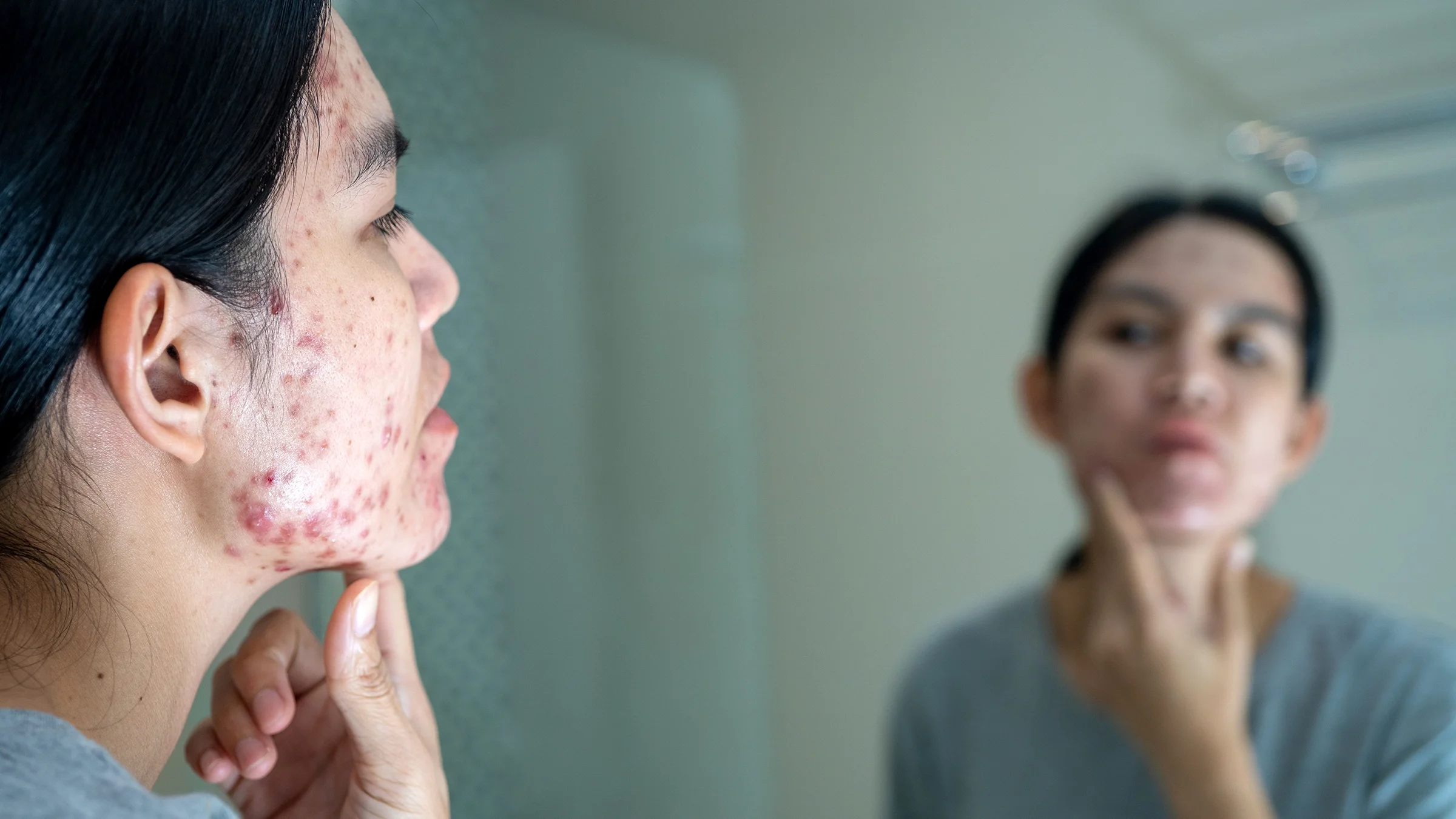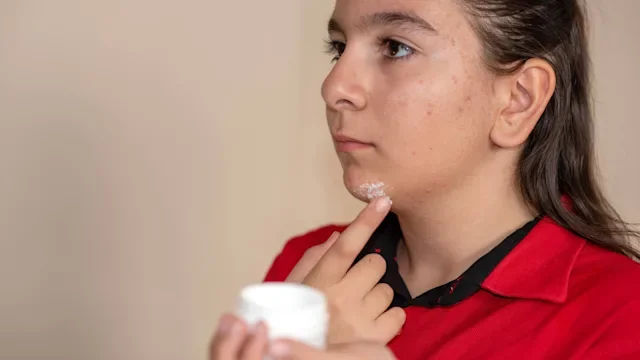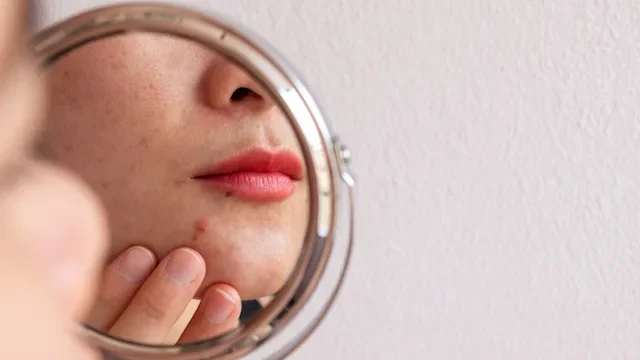Key takeaways:
Spironolactone (Aldactone, CaroSpir) and Accutane (isotretinoin) are two oral medications used to treat acne.
Spironolactone is prescribed off-label for hormonal acne in women.You may be told to continue taking it as long as it’s working for your acne. Accutane is FDA-approved for severe acne after other options have failed. It’s typically limited to short-term use.
If you’re able to get pregnant, taking Accutane requires monthly pregnancy tests. You’ll also be monitored closely for side effects. For most people, routine blood tests aren’t typically needed with spironolactone.
The best acne treatment for you may depend on your acne type, severity, and preferences. Your dermatologist can help you find options that meet your needs.
Save on related medications
Dealing with acne can be a frustrating experience. For many people, it’s not just an occasional breakout, but a persistent struggle ranging from stubborn pimples to severe, painful cysts. Fortunately, there are a variety of acne treatments to choose from — but which one is right for you?
The best choice can depend on the type of acne you have, its severity, and your preferences. Spironolactone (Aldactone, CaroSpir) and Accutane (isotretinoin) are two oral medications that you may come across in your search for clearer skin. Both are available with a prescription. But, there are several important differences between them to consider.
1. Accutane is approved for acne, while spironolactone may be prescribed off-label
One major difference between Accutane and spironolactone is that Accutane is FDA-approved to treat acne. And while spironolactone has been used for decades to treat certain types of acne, it’s not actually approved for this use.
Search and compare options
Initially approved in 1982, Accutane was the first brand-name isotretinoin product. Today, isotretinoin is available as branded generics, including Accutane, Claravis, and Amnesteem. Generic isotretinoin capsules are also available. Accutane is approved for adults and adolescents ages 12 and older.
Spironolactone is an oral diuretic (water pill) that’s approved for health conditions such as heart failure, high blood pressure, and swelling. But it has been used off-label to treat acne in women since the 1980s. Adults and adolescents may be prescribed spironolactone for acne. But it’s typically avoided for acne in men since it can cause breast enlargement as a side effect.
What to expect: Spironolactone is a diuretic (water pill) that’s often prescribed off-label for hormonal acne. Because of how it works, spironolactone has some unique side effects — from breast tenderness to irregular menstrual cycles.
Waiting for results: If you’ve recently started taking Accutane (isotretinoin), it’s natural to wonder when you’ll start seeing clearer skin. But exactly how long does Accutane take to work?
Your complete guide: Finding the right acne treatment can involve some trial and error. But it helps to know the best place to start based on your acne type and severity. Experts cover which treatments work best for each type of acne.
2. Spironolactone and Accutane work differently to treat acne
Another difference between spironolactone and Accutane is how they work to clear up acne. Spironolactone targets hormones that are thought to cause acne. Accutane reduces oil in your skin, among other effects.
Accutane is a retinoid (a medication related to vitamin A). It’s thought to treat acne in a few different ways. One way Accutane works is by lowering the amount of oil that’s produced in your skin. Too much oil can sometimes lead to clogged pores and acne. Accutane can also prevent pimples by stopping your pores from getting clogged by certain cells in your skin.
As mentioned above, spironolactone is a type of water pill. But when it’s used for acne treatment, spironolactone is known as a hormonal agent. That’s because it works to treat acne by blocking hormones called androgens (such as testosterone) from making too much oil in the skin.
3. Spironolactone and Accutane have different side effects and risks to consider
Because of how they work, spironolactone and Accutane can also cause different side effects. They have different risks to consider, too.
Accutane has a long list of possible side effects, including:
Dry lips and skin
Dry eyes
Nosebleeds
Muscle and joint pain
Worsening acne
Mood changes
Liver problems
Skin reactions
Accutane can also harm a growing fetus. You’ll be enrolled in a mandatory program called iPLEDGE to manage this risk. If you’re able to become pregnant, the iPLEDGE program requires you to take pregnancy tests before starting Accutane and again every month during treatment. You’ll also need to take two forms of effective birth control while you’re taking the medication.
As a water pill, spironolactone removes fluid from your body. So, you may notice that you’re urinating more often while taking it. Other potential spironolactone side effects include:
Headache
Dizziness
Irregular menstrual cycles
Breast tenderness
Fatigue
Nausea
Diarrhea
Most people taking spironolactone for acne don’t need regular blood tests. But your prescriber may recommend them if you have risk factors for high potassium. And similar to Accutane, spironolactone isn’t recommended during pregnancy. But, you don’t need to enroll in a program or take monthly pregnancy tests to fill your prescription.
4. Accutane can be an effective option for severe acne, while spironolactone may be helpful for hormonal acne
When choosing the best treatment for your acne, it’s important to consider your acne type and severity. For example, spironolactone can be particularly helpful for hormonal acne. Accutane, on the other hand, is typically reserved for severe acne that hasn't responded to other treatments or is causing permanent scarring.
Hormonal acne is a type of acne that usually happens around the time of your menstrual cycle, during menopause, or at other times when your hormones may be fluctuating. Spironolactone can help hormonal acne by targeting hormones that make acne worse. For best results, your dermatologist may have you combine spironolactone with other acne treatments.
Accutane is recommended for acne that’s severe — including hormonal acne. It’s reserved for use when other oral or topical treatments haven’t worked well. Accutane is very effective, but it has many potential risks and side effects compared with other options.
Many things have been linked with acne, including genetics, bacteria, and hormones. Diet, stress, and sleep quality are also known triggers for breakouts. Medications are another potential culprit. Your dermatologist can help you figure out what might be causing your acne and how best to treat it.
5. Spironolactone is taken long term, while Accutane is taken for a short period of time
With both spironolactone and Accutane, it can take a few weeks before you notice an improvement in your acne. But how long you’ll need to take them can be different.
A typical course of Accutane usually lasts 4 to 5 months (sometimes less), which is sufficient for most people to see results. But if needed, a second course may be recommended at least 2 months after the first course. Accutane often clears the skin for a long time. And for many people, their skin stays clear permanently.
There isn’t a recommended amount of time that you should take spironolactone. In general, your dermatologist may have you continue it as long as it’s helping your acne and you’re not having side effects. One small study followed women who took spironolactone to treat acne for up to 8 years. Researchers found that long-term use appeared to be safe.
Be sure to attend all of your follow-up appointments with your dermatologist. That way, they can make sure your acne treatments are safe and working well for you.
The bottom line
Spironolactone (Aldactone, CaroSpir) and Accutane (isotretinoin) are two prescription medications used to treat acne. Spironolactone can be helpful for hormonal acne in women. Accutane is usually reserved for severe acne that doesn’t respond to other treatments.
Both spironolactone and Accutane should be avoided during pregnancy. But taking Accutane requires enrollment in the iPLEDGE program to manage the risk of birth defects. Other common Accutane side effects include dry skin and eyes, while spironolactone can cause breast tenderness and increased urination.
If you’re dealing with stubborn acne, talk to your dermatologist about your options. Depending on your acne type and severity, they may prescribe one of these oral treatments.

Why trust our experts?



References
American Academy of Dermatology Association. (n.d.). Stubborn acne? Hormonal therapy may help.
Bagatin, E., et al. (2019). Adult female acne: A guide to clinical practice. Anais Brasileiros de Dermatologia.
Fortress Biotech. (2021). Fortress Biotech’s partner company, Journey Medical Corporation, in-licenses and launches Accutane for the treatment of severe recalcitrant nodular acne.
JG Pharma Inc. (2023). Accutane - isotretinoin capsule, gelatin coated [package insert].
Layton, A. M., et al. (2017). Oral spironolactone for acne vulgaris in adult females: A hybrid systematic review. American Journal of Clinical Dermatology.
Leyden, J. J., et al. (2014). The use of isotretinoin in the treatment of acne vulgaris. Journal of Clinical and Aesthetic Dermatology.
Reynolds, R. V., et al. (2024). Guidelines of care for the management of acne vulgaris. Journal of the American Academy of Dermatology.
Roberts, E. E., et al. (2020). Use of spironolactone to treat acne in adolescent females. Pediatric Dermatology.
Shaw, J. C., et al. (2002). Long-term safety of spironolactone in acne: Results of an 8-year followup study. Journal of Cutaneous Medicine and Surgery.
Thiboutot, D. M. (2009). The role of follicular hyperkeratinization in acne. Journal of Dermatological Treatment.














